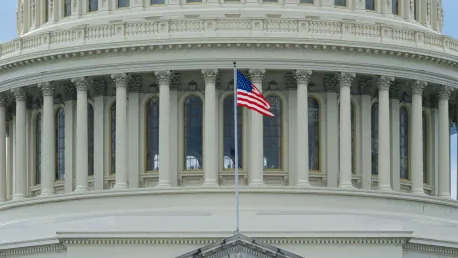In a crucial move to avert a government shutdown, both the U.S. House and Senate have passed a short-term spending bill, temporarily funding the federal government and extending the deadline for a comprehensive budget resolution until after the November elections. The House approved the continuing resolution (CR) package with a decisive 341-82 vote, while the Senate followed suit with a strong majority of 78-18. This stopgap measure, although providing temporary relief, effectively postpones the contentious budget debates to the lame-duck session, which follows the midterm elections. The approval of this short-term bill highlights the ongoing struggle within Congress to find common ground on long-term fiscal policies.
Despite commitments from congressional leaders to adhere to the regular appropriations processes, both chambers fell short in passing all the necessary spending bills. The House managed to pass only five out of twelve required bills, all strictly along party lines. Meanwhile, the Senate Appropriations Committee reached bipartisan agreements on eleven bills, yet none of these were brought to the floor for a full vote. This lack of progress brings into focus the challenges and gridlock that have become synonymous with today’s legislative process. Speaker Mike Johnson, who had previously taken a strong stance against short-term CRs, found himself supporting this temporary measure, signaling the complexities and negotiations that often characterize the federal budget approval process.
Legislative Challenges Ahead
Speaker Johnson faces mounting pressure from various stakeholders as the deadline for a comprehensive budget looms. Appropriators, defense hawks, Democrats, and the White House are all pushing for a substantive global spending deal to finalize the fiscal year 2025 bill. Johnson has also committed to addressing other critical legislative priorities, such as the extension of the farm bill and the must-pass defense authorization bill. The convergence of these high-stakes issues adds layers of complexity to the legislative process, making Johnson’s leadership a focal point. His promise to avoid an omnibus spending bill during the upcoming session underscores the tightrope he must walk between satisfying his party’s fiscal conservatives and reaching bipartisan agreements necessary to govern effectively.
With the midterm elections on the horizon, the balance of power in Congress and the White House could shift, further complicating the legislative landscape. If Republicans retain control, Johnson intends to seek another term as Speaker. However, a potential change in House control could lead to a power struggle within the GOP Conference, affecting strategic decisions and legislative agendas. The political dynamics at play not only challenge Johnson’s leadership but also influence broader governance issues, from military funding to agricultural subsidies. The heightened stakes of the upcoming fiscal decisions are inextricably linked to the outcomes of the midterm elections, adding urgency and political tension to the budgetary process.
High Stakes and Future Outlook
In a critical effort to prevent a government shutdown, both the U.S. House and Senate have approved a short-term spending bill. This bill temporarily funds the federal government and postpones the deadline for a full budget resolution until after the November elections. The House passed the continuing resolution (CR) with a 341-82 vote, and the Senate followed with a 78-18 vote. This stopgap measure, though offering temporary relief, pushes the heated budget discussions to the lame-duck session post-midterm elections. It underscores the ongoing struggle within Congress to reach consensus on long-term fiscal policies.
Despite promises from congressional leaders to stick to regular appropriations processes, both chambers fell short. The House passed only five out of twelve required bills, all along party lines. The Senate Appropriations Committee reached bipartisan agreements on eleven bills, but none were brought to the floor for a vote. This lack of progress highlights the challenges and gridlock in today’s legislative process. Speaker Mike Johnson, who had opposed short-term CRs, supported this temporary measure, illustrating the complexities and negotiations required in the federal budget approval process.









